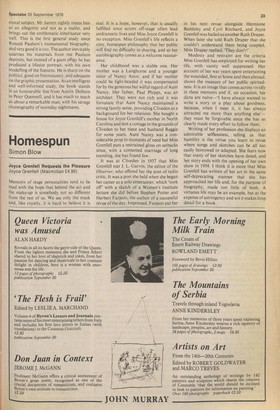Homespun
Simon Blow
Joyce Grenfell Requests the Pleasure Joyce Grenfell (Macmillan £4.95) Memoirs of stage personalities tend to be read with the hope that behind the act and the make-up is somebody not so different from the rest of us. We see only the mask and, like royalty, it is hard to believe it is real. It is a hope, however, that is usually fulfilled since actors off-stage often lead undramatic lives and Miss Joyce Grenfell is no exception. Miss Grenfell's life reflects a cosy, homespun philosophy that her public will find no difficulty in sharing, and so her autobiography comes as a welcome reassurance.
Her childhood was a stable one. Her mother was a Langhorne and a younger sister of Nancy Astor, and if her mother could be light-headed it was compensated for by the generous but wilful regard of Aunt Nancy. Her father, Paul Phipps, was an architect. They were not rich and it was fortunate that Aunt Nancy maintained a strong family sense, providing Cliveden as a background for her relations. She bought a house for Joyce Grenfell's mother in North Carolina and lent a cottage in the grounds of Cliveden to her niece and husband Reggie for some years. Aunt Nancy was a considerable prop in moments of need but Miss Grenfell puts a restrained gloss on setbacks since,, with a contented marriage of long standing, she has found few.
It was at Cliveden in 1937 that Miss Grenfell met J. L. Garvin, the editor of the Observer, who offered her the post of radio critic. It was a post she held when she began her career as a solo entertainer, which look off' with a sketch of a Women's Institute lecture she did before Stephen Potter and Herbert Farjeon, the author of a successful revue of the day. Impressed, Farjeon put her
in his next revue alongside Herinione Baddeley and Cyril Ritchard, and Joyce Grenfell was hailed as another Ruth Draper. When later she told Ruth Draper that she couldn't understand them being coupled, Miss Draper replied, 'They don't !'
Modesty and restraint are the criteria Miss Grenfell has employed for writing her life, with vanity well suppressed. Her account of her war years spent entertaining the wounded, first at home and then abroad, shows the measure of her public spiritedness. It is an image that comes across vividly in these memoirs and if, on occasion, her dicta are naIve—'1 have always wanted to write a story or a play about goodness, because, when I meet it, it has always attracted me more than anything else'— they must be forgivable since she has so clearly made every effort to follow them.
Writing of her profession she displays an admirable selflessness, telling us that humility is the virtue you learn in revue where songs and sketches can be all too easily borrowed or adapted. She fears now that many of her sketches have dated, and her story ends with the opening of her own show in 1954. I think it is more that Miss Grenfell has written of her art in the same self-deprecating manner that she has approached her life and, for the purpose of biography, made too little of both. A virtuous life may be an example, but at the expense of astringency and wit it makes limp detail for a book.


































 Previous page
Previous page